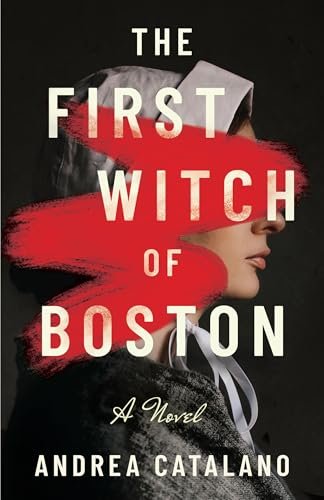
Book Review of The First Witch of Boston
Review of The First Witch of Boston by Kristina Johnson
When I first stumbled upon The First Witch of Boston, I was immediately drawn in—not just by the gripping premise steeped in history, but by the promise of a love story intertwined with the weight of societal oppression. Kristina Johnson’s ability to weave together personal tragedy and colonial injustice made me curious to see how these themes would unfold, especially knowing from the very start that Maggie Jones will face the grim fate of execution for witchcraft. However, what I found was so much more than a tale of doom; it’s a haunting exploration of love in the face of despair, and I couldn’t put it down.
From the outset, the story centers on Thomas and Maggie Jones, a couple whose bond is strong yet fraught with the tensions of their time. Johnson expertly paints a picture of their world, one where Maggie’s boldness as a healer places her in perilous opposition to the rigid norms of colonial New England. The way Thomas adores her, despite their differing temperaments—his reserved nature contrasting with her fiery spirit—makes their relationship feel incredibly authentic. It’s this devotion, amidst the relentless dread of societal judgment, that left me breathless, deeply feeling every bit of their love and, ultimately, their loss.
One of the standout elements of the novel is its alternating point-of-view structure. We first journey through Thomas’s perspective, allowing us to feel his helplessness as the storm of accusations gathers. Then, we switch to Maggie—intimate and revealing. These shifts gave me a layered emotional experience, as if I were being entrusted with their most profound fears, dreams, and disappointments. It’s an odyssey of intimacy and understanding that beautifully illustrates how even the most generous love can be overshadowed by external forces.
The prose itself is a delight, marked by Johnson’s elegant storytelling. She balances historical realism with emotional depth seamlessly, portraying the grittiness of life in colonial times without turning her characters into mere symbols of their struggles. There’s a moment when Maggie reflects on her life while tending to her herb garden—a poetic serenity amid chaos—and I found it profoundly resonant. It reminded me of how essential it is to find small pockets of peace, even when the world feels overwhelmingly hostile.
While the narrative tackles incredibly heavy themes—capital punishment, misogyny, and the terror of witchcraft accusations—it does so with sensitivity. Readers should be aware of the emotional weight as they navigate these harrowing topics. For me, the story wasn’t simply about the historical backdrop but an urgent reflection on the timeless struggles women face against oppressive systems.
In conclusion, The First Witch of Boston is not just a story of witches and tragedy; it’s an intimate portrait of a woman’s life cut short by societal fear and injustice. It’s a poignant reminder of the cost of stepping outside prescribed roles, told with a deft hand and emotional nuance. If you appreciate historical fiction that delves into the intricacies of love, loss, and resilience, I wholeheartedly recommend this gem. Prepare to be moved; this book left a lasting imprint on my heart.
⭐️⭐️⭐️⭐️⭐️ (5 stars for emotional depth, elegant prose, and a love story that makes history feel painfully intimate.)
Discover more about The First Witch of Boston on GoodReads >>






